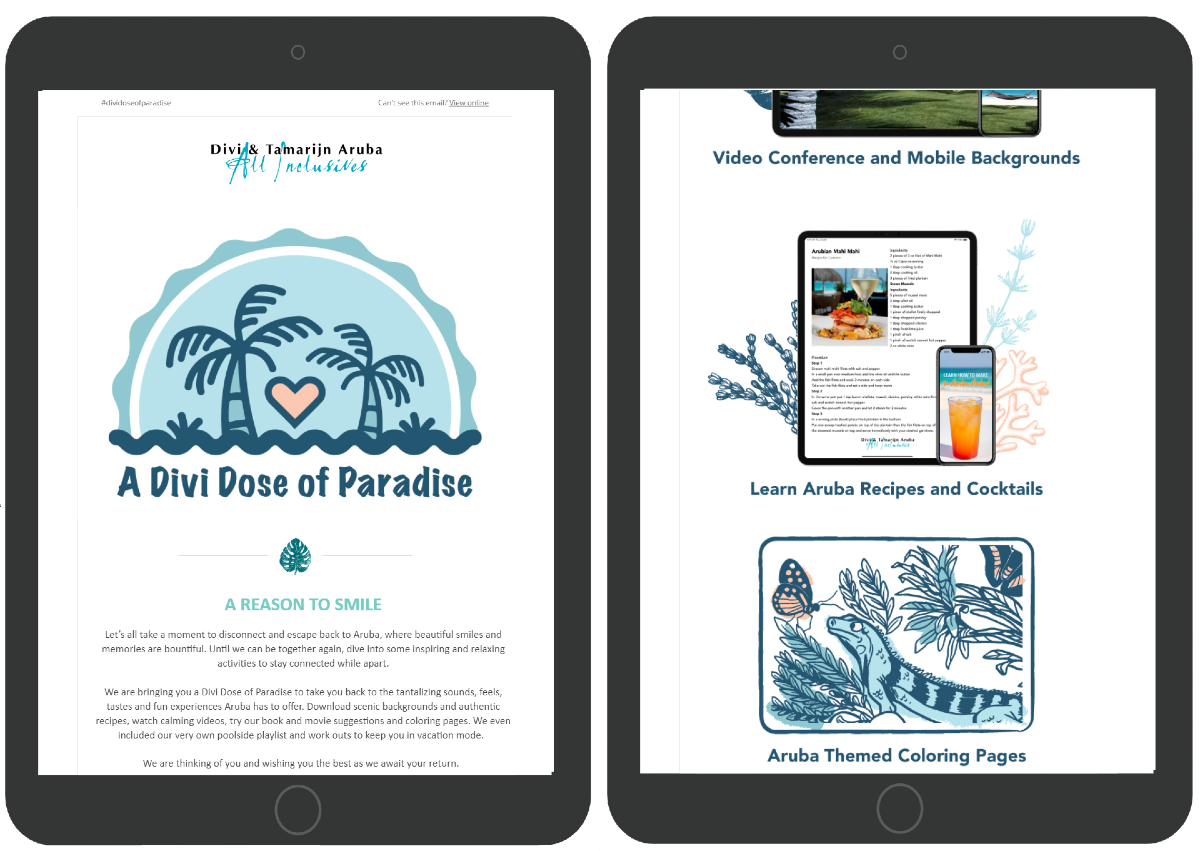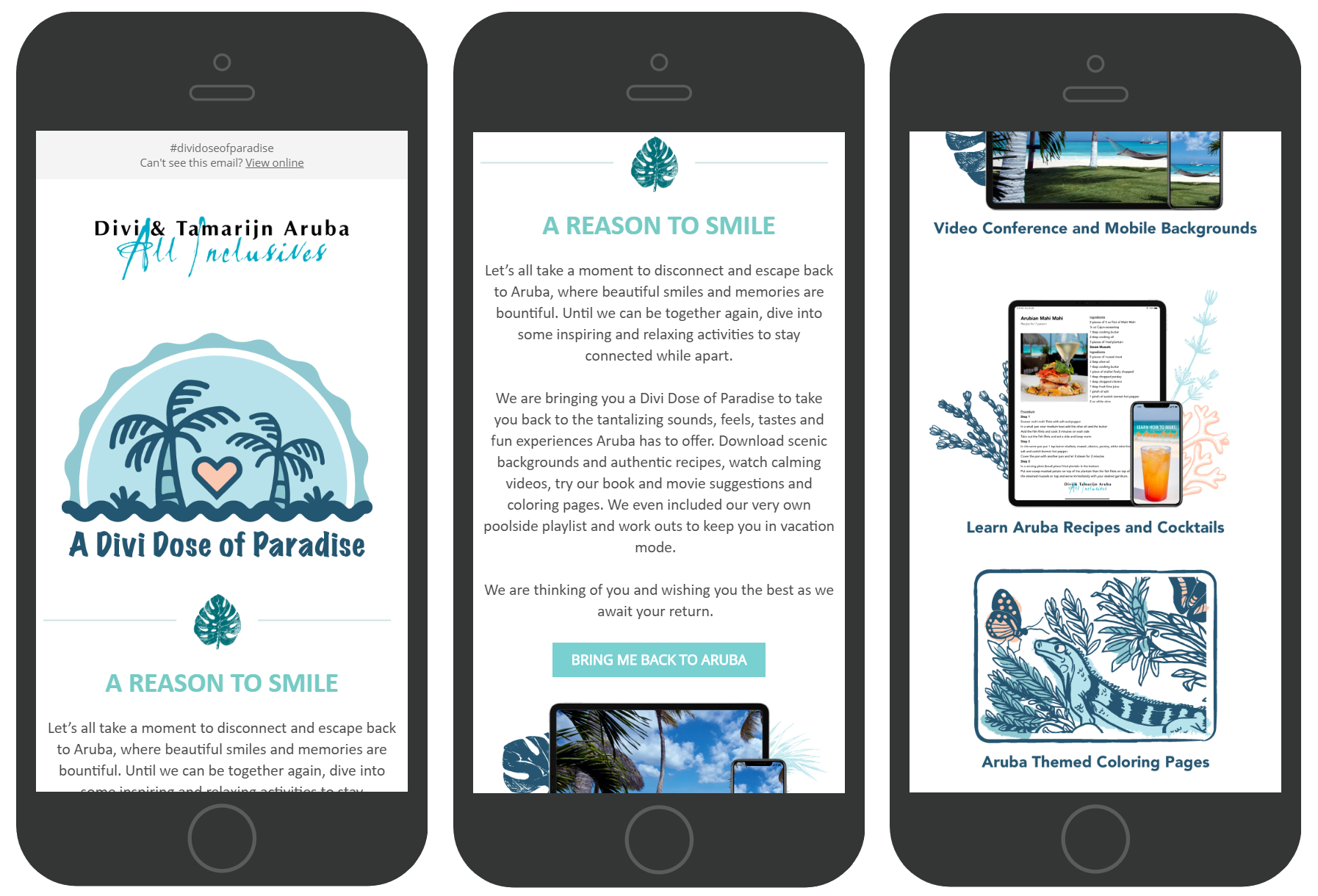While our industry continues to deal with a state of travel that is breaking all norms, there is actually an opportunity to solidify relationships with your audience. A strong email marketing strategy will keep loyal guests engaged and can even be a source of positive news to your audience as you lead them down the booking path for the future. When they are ready to travel again, your hotel can be at the forefront of their planning.
As the only platform that allows you to directly choose who, when and how you want to communicate to your audience, email is the driving force to every marketing and overall communication strategy. As COVID-19 slows travel significantly, now is a great time to re-evaluate and recalibrate your marketing efforts. Consider these points when doing so.
In the Short-Term:
Take the time to establish a real connection with travelers and build your brand’s relationship with them.
The connections that are built now should not only serve as the foundation for a relationship between your property and your guests, but also as the foundation for your marketing efforts moving forward. The goal is to establish the relationship so that when guests are presented with similar hotel options, they choose your brand.
- Highlight helping and positive news.
The world is a pretty dark place right now. Send uplifting content about how your team is helping the local community and consider content around the property’s unique features since it is likely those are also positive memories guests have from the last time they stayed with you e.g. virtual tours of the beach, the view from the rooftop bar, a signature cocktail recipe, etc. Anything to attract people to your property with memories or dreams of a visit in the future are a bright spot in their inbox.
Here’s a great example from Divi & Tamarijn Aruba All Inclusive Resorts.


- Create marketing personas.
What resonates with some guests may not resonate with others – consider using this time to learn who your guests are, where they are located, and how to segment and communicate to them effectively. For example, drive market guests will likely be coming to your hotel before long-distance guests. Put yourself in the customer’s shoes and limit sending emails to guests that are unlikely to be in a position to visit you anytime soon, particularly international guests.
- Highlight stories from previous guests.
It is proven that User Generated Content (UGC) has a significant impact on influencing bookings and is viewed as more trustworthy and authentic than traditional marketing messages. Studies show a 29% increase in web conversions when featuring user generated content. Think about including a lead in from past guests to a testimonial page on your website.
- Consider using real names in your email correspondence.
Studies show that emails from named people (i.e. “Dave Smith, General Manager”) enjoy a higher open rate by as much as 35% versus emails from a generic corporate email address (i.e. “The Palace Hotel). Humans are wired to be more invested in people than corporations, so let your email subscribers know that real people exist behind your efforts and highlight them. That goes both ways – use your email platform to address your contacts by name whenever possible.
- Be sensitive to people’s situations and needs.
Use tones that let people know you’re there for them and understand their needs. There’s still a great deal of hesitancy around the safety of travel so you should plan to reassure your subscribers and clearly outline what your property is doing to ensure their safety, and what the cancellation terms are should their plans change.
In the Mid-Term:
Highlight and capture the dreaming phase for your travelers as travel begins to resume.
As cities and businesses begin to re-open, make sure you have a communication strategy in place that keeps your property in your guests’ minds. Highlighting and speaking to the dreaming phase that most travelers are currently in is the best way to do that – create campaigns based around what your guests are interested in and what is likely to inspire them to travel again. Additionally, make sure your cancellation policy is clear and easily found on your website.
-
Create campaigns based on marketing personas.
As different states and areas take steps toward recovery at different times, begin creating campaigns that capture the attention of your travelers. Highlight summer + fall vacations, drive market staycations and any other relevant options.
- Segment your contacts appropriately whenever possible.
Use geotargeting and any other relevant audience segments to ensure that your message is laser focused. This will be particularly important post-coronavirus. With the flood of coronavirus-related emails and offers being sent, it is extremely important that your email offers relevant and engaging content that stands out from the noise.
- Reach out to recent guest cancellations.
It’s likely that guests who cancelled are still planning to travel at a later date. By targeting guests that booked with you and then cancelled you are pursuing a group who should have a high-intent to travel and are likely to rebook their stay soon. Appeal to reasons they should rebook at your hotel by highlighting amenities and reassure them that your hotel is a safe environment by outlining the measures you’ve put in place to comply with social distancing and state mandates.
-
Use re-engagement emails to remove “cold” emails.
Subscribers who don’t engage with your emails can drag down your sender reputation and affect your future send rates. While it can be hard to let go of a large email database, continuing to send to email addresses that have not opened your previous emails can result in your emails being pushed toward the spam filter due to poor list hygiene so it is far more effective to send targeted emails to engaged lists than larger poorly segmented lists.
In the Long-Term:
Position yourself for future success.
It’s already becoming clear that travel won’t return to pre-coronavirus levels for some time. What is likely to emerge is a change in behavior towards road trips and drive markets, particularly to outdoor locations (beaches, national parks, nature) vs. city breaks and international travel. Recreational travel is unlikely to bounce back all at once; it will be a long process. Make sure that your messaging is sensitive to this and reassure your guests that you are there for them for the long haul with a safe place, great service, as well as packages and amenities tailored to their needs. Ensure you are sending relevant messages to your audience with list segmentation. This will keep your list fresh and produce higher conversion.
-
Promote your property as a go-to for self-care and wellness.
With the rise in fitness, wellness and general health-consciousness occurring even before the prominence of COVID-19, there’s no secret that health and wellness will continue to be at the forefront in the minds of travelers. Use this to your advantage by highlighting how your hotel values these things, then create marketing content and promote wellness packages. Feature your spa, fitness amenities, and dining options that align your property with self-care and promote good mental and physical health.
- Send the right message to the right person at the right time.
By segmenting and managing your email audience list health, you can effectively send very targeted emails to the group that is most likely to book and engage with the specific messaging. This strategy will help you keep costs down because you are sending smaller, targeted messaging to the most interested audience. Your ROIs should also trend higher. Vizergy’s TargetingHub solution is a great way to ensure you are identifying the right audience with the right message, so contact us if you would like to hear more about how to use this powerful tool to drive your communication and marketing efforts.
There won’t be a linear path to recovery, some markets will recover faster than others, and a lot will depend on consumer sentiment towards air travel. Making sure you are working smarter, not harder, to drive your marketing success is key.
For more information on building your recovery plan, contact us.
